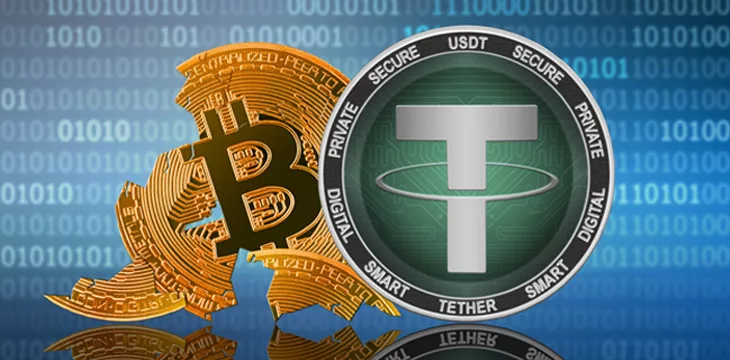|
Getting your Trinity Audio player ready...
|
Tether got a new Bahamian banker, Binance bid buh-bye to BUSD, and Justin Sun’s stablecoin fueled this week’s BTC price pump.
On Tuesday, Bloomberg reported that Tether had partnered with yet another Bahamian bank—Britannia Bank & Trust—to which customers looking to purchase Tether’s USDT stablecoin were being instructed to send their cash. Customers reported receiving these instructions for a couple of months now, but it’s unclear when Tether’s relationship with Britannia officially began.
More on Britannia in a moment, but the new partnership is a vivid illustration of the troubles that Tether has had maintaining connections with the U.S. banking system to permit its customers to (allegedly) purchase USDT with U.S. dollars.
In July, the U.S. Department of Justice (DOJ) unsealed orders authorizing the seizure of $105 million from the New York-based Mitsubishi UFJ Trust and Banking Corporation (MUFJ). MUFJ was allegedly obfuscating the fact that it was handling dollar transactions on behalf of Bahamas-based Deltec Bank & Trust, Tether’s primary banking partner.
Deltec is notorious for also working with Sam Bankman-Fried’s FTX exchange and market-maker Alameda Research, both of which filed for bankruptcy last November after fraudulently misappropriating their customers’ cash.
Years before that, Deltec provided the first ever ‘assurance’ that Tether was storing sufficient fiat reserves to support USDT (although the document was signed with an illegible scrawl with no printed name identifying the signer).
Tether also makes use of Bahamas-based Capital Union Bank, as revealed in April following the failure of New York’s ‘crypto-friendly’ Signature Bank. Tether had advised U.S. customers to send dollars to Capital Union via Signet, Signature’s 24/7 digital asset settlement mechanism, despite Signature previously shutting accounts associated with Tether and its sister company Bitfinex based on suspicions of bank fraud and terrorist financing.
Patrick Tan, general counsel of blockchain analytics firm ChainArgos, told Bloomberg that “the secrecy surrounding Tether’s banking relationships continues to be a major impediment … discouraging traditional asset managers with little tolerance for regulatory risk from more active participation in this space.”
One has to wonder how comfortable Britannia’s U.S. correspondent banks will be with the inevitable extra scrutiny that association with Tether invariably brings. Particularly given recent guidance from the U.S. Federal Reserve that its member banks are playing with fire when they hitch their wagons to stablecoin operations.
Fool Britannia
Britannia Bank & Trust is part of the London-based Britannia Financial Group, which is led by a family with an unhealthy fixation on its “more than fives [sic] centuries of history.”
Tether, with over $80 billion of USDT is now relying on a private Bahamian bank (headquartered in the UK) for $ off-ramps that based on its last financial filings has a GBP 191 million balance sheet. That’s not Tether resiliency. That’s desperation as that’s a flea sized bank. pic.twitter.com/cnbWnG3Wck
— Novacula Occami (@OccamiCrypto) August 30, 2023
History aside, filings indicate that Britannia’s Bahamian offshoot has a relatively puny balance sheet. It speaks volumes about Tether’s toxic brand that they’ve been reduced to partnering with such fiscal minnows, but there are other aspects in which Tether and Britannia likely find commonality.
For instance, Britannia founder Julio Martin Herrera Velutini stepped down as director last year after pleading not guilty to U.S. federal charges of bribing the former governor of Puerto Rico. Velutini, a dual Venezuelan-Italian citizen, was trying to convince the governor to dismiss the investigator, probing whether Velutini’s local operations had violated the Bank Secrecy Act.
Velutini’s exit led to his 26-year-old son Julio Cesar Herrera assuming control over Britannia. A fawning press release masquerading as a media profile painted Junior as “a shining example of how hard work and dedication can lead to incredible success,” leaving out the obvious advantages of being born the son of a billionaire.
Interestingly, Britannia once fired BDO in the middle of an audit the bean-counters had been hired by Britannia to conduct. The Italian branch of BDO was hired by Tether to provide its most recent ‘attestations’ of the fiscal reserves (allegedly) backing the $83 billion worth of USDT currently circulating.
Tether infamously fired its auditors Friedman LLP in January 2018 because Friedman’s “excruciatingly detailed procedures” were taking longer—and likely revealing more—than Tether was prepared to tolerate. Tether’s half-baked quarterly ‘attestations’ of its reserves are no substitute for a true third-party audit of its perennially suspect operations.
Garbo, sorry, Paolo talks!
Tether’s chief technical officer, Paolo Ardoino, sat for a rare interview this week with The Defiant podcast’s Camila Russo. Ardoino gives live interviews about as frequently as Halley’s Comet visits our neck of the solar system, largely because he’s prone to sweating buckets when forced to justify Tether’s sketchier activities.
Pressed by Russo as to why the audit that was promised over five years ago—and was said to be “months, not years” away some 25 months ago—Ardoino managed to chuckle while insisting that “we are working on that.” But Ardoino insisted the real problem was that “the top four” auditing firms are “afraid to take on a stablecoin, especially one big as Tether.”
Ardoino claimed that the string of insolvencies and outright criminality that has plagued ‘crypto’ over the past 18 months means “the market is tainted” and thus auditors don’t want to risk the “reputational” damage of associating themselves with companies like Tether.
When Russo pointed out that attestations by Tether rival Circle include the CUSIP codes for the Treasury bills backing their billions’ worth of USDC tokens, the best Ardoino could manage was that this was “something we are discussing internally.”
Tether’s last report claimed to show nearly $56 billion worth of T-bills, a haul larger than most countries, and yet no one in U.S. trad-fi seems to have ever heard of Tether. A defensive Ardoino tried to pivot to the fact that Tether was the first stablecoin “to break down our reserves,” omitting the fact that this was a stipulation of its $18.5 million settlement with New York Attorney General’s office.
As for Tether’s caginess regarding its banking connections, Ardoino noted that some media outlets had published lists of Tether’s banking partners, omitting the fact that these outlets had to dig for this information because Tether wasn’t talking.
But hey, you can trust Paolo. This is the guy, after all, who recently posted a picture of shipping containers allegedly containing Tether’s new BTC mining rigs with the company’s logo inelegantly Photoshopped on the side. When people with working eyes called him out for this falsehood, Ardoino responded not with genuine photos of the containers but an animated video showing an even more impressive array of containers. Remember, kids, if you’re gonna lie, lie big.
Binance has had enough pegging, thanks
In other stablecoin news, this week saw the Binance exchange inform customers that it will “gradually cease support for BUSD products.” While assuring customers that BUSD “will always be backed 1:1 by USD,” Binance urged users to “convert their BUSD assets into other available assets on Binance prior to February 2024.”
BUSD has been on life support since February when New York’s Department of Financial Services (NYDFS) ordered the New York-based Paxos Trust—with which Binance had partnered on BUSD—to halt minting new BUSD due to “unresolved issues related to Paxos’ oversight of its relationship with Binance.”
The NYDFS found fault with the fact that Binance was minting an entirely separate BUSD token called ‘Binance-Peg BUSD’ on the exchange’s own BNB Smart Chain. On multiple occasions, there were over a billion dollars’ worth of Peg-BUSD circulating without any fiat reserves whatsoever.
》 Light Blue = number of $BUSD transactions
》 Dark Blue = number of #BinancePegBUSD transactions
This is a real chart. Paxos's $BUSD ("Binance BUSD") as approved by @NyDFS was never intended to be used for anything. The point of $BUSD was to let Binance print US dollars. pic.twitter.com/dTp9HKRYUW
— ChainArgos (@ChainArgos) August 30, 2023
As digital sleuths observed this week, the number of Peg-BUSD transactions utterly dwarfed those of actual BUSD. The suspicion is that the whole reason Binance partnered with Paxos in the first place was to “print US dollars” without worrying about dealing with those pesky U.S. banks and their confounded regulations.
Binance customers looking to swap their BUSD for another stablecoin have been encouraged to pick First Digital Group’s new FDUSD, which only launched a month ago. Binance has been heavily promoting FDUSD, along with Justin Sun’s sketchy TUSD, as part of the exchange’s weird pivot away from Tether and toward stablecoins, over which it has more direct control. This will all end swimmingly, we’re sure.
The Sun never sets
Finally, Thursday saw a major sell-off of BTC following word that the U.S. Securities and Exchange Commission (SEC) would slow-roll further review of all exchange-traded fund (ETF) applications. The crash wiped out all the gains from BTC’s price spike earlier this week following a pro-ETF court order.
But some digital detectives have taken a closer look at that spike and concluded that very little of it was driven by actual dollars coming into the system. There appears to have been a coordinated effort to mint new stablecoins—the finger of scorn points squarely at TUSD—and transfer them to Binance immediately prior to that pro-ETF court order making headlines.
Around the same time, around 30,000 BTC tokens were sent to exchanges, creating all the ingredients for some major wash-trading manipulation. Woe to any retail customer foolish enough to believe BTC was truly moon-bound and ended up serving as exit liquidity for these scammers.
Honestly, those criminal charges can’t come soon enough.
Follow CoinGeek’s Crypto Crime Cartel series, which delves into the stream of groups—from BitMEX to Binance, Bitcoin.com, Blockstream, ShapeShift, Coinbase, Ripple,
Ethereum, FTX and Tether—who have co-opted the digital asset revolution and turned the industry into a minefield for naïve (and even experienced) players in the market.

 05-07-2025
05-07-2025 





